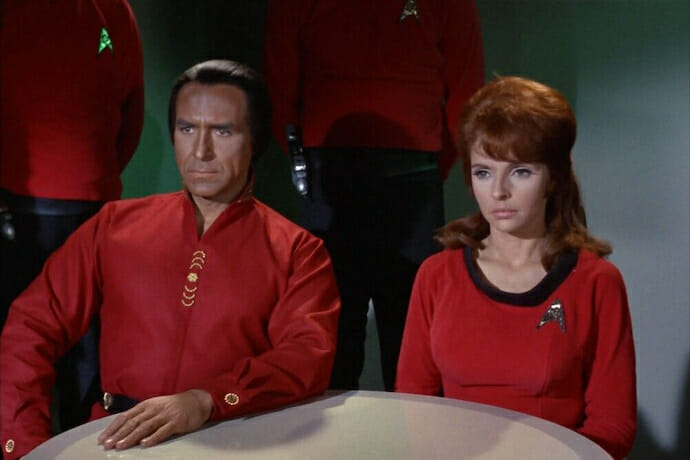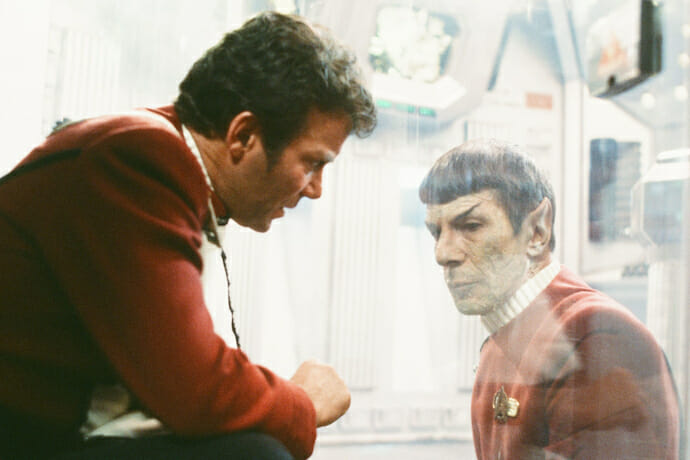‘Star Trek II: The Wrath of Khan’ is the Movie About Death and Grieving That 2021 Desperately Needs
In early 2015, upon the news of actor Leonard Nimoy’s death, best-known to millions around the world as Mr. Spock, many fans and admirers took to Twitter to express condolences. Even then-President Obama sent out a press release mourning Nimoy’s death, which included the president admitting that he “loved Spock,” whom he called “cool, logical, big-eared and level-headed, the center of Star Trek’s optimistic, inclusive vision of humanity’s future.”
But there was another tweet I saw that really resonated from that day. A film critic and blogger from a far snobbier, elitist publication that I will not name here said that he considers Nimoy’s finest work to be in Star Trek II: The Wrath of Khan, which he considers to be “one of the best, most wrenching studio movies about death,” adding that he couldn’t “imagine how painfully it will play now.” I was very touched by that tweet, because I love The Wrath of Khan, which not only is my favorite Trek movie but also one of my favorite movies of all time. The point I’m trying to make is that Star Trek II: The Wrath of Khan is one of the greatest films that deals with death.
I would also add that The Wrath of Khan is also about mortality, with former Captain, now Admiral Kirk (William Shatner), grappling with his getting older being crucial to the film’s success. But, even more than that, it’s about grief. Grieving the loss of a loved one, grieving what could have been, grieving that the current days are not as eventful or fruitful as they were in the past…it’s all there.
A little over a year ago, in anticipation of the soon-to-debut Star Trek: Picard TV series, I traveled to my favorite local theater, Alamo Drafthouse, to see another Trek classic, Star Trek: First Contact. I saw First Contact in a crowded theater, full of Trekkies (including some in costume), a very enthusiastic MC for the screening, and a sense of camaraderie among fans of the franchise. It inspired me to write an article about how seeing the film “gave me a boost of optimism I didn’t know I needed,” as I wrote at the time, and how it had pertinent messages, particularly for an election year. A year after that screening and article, everything changed. When I went to Alamo Drafthouse most recently for a screening of The Wrath of Khan, I was required to wear a facemask. I was one of only a handful of attendees, all socially distanced from one another. Given the current state of the world, it was unlikely that this screening of another Star Trek film would give me a similar “boost of optimism.” But, as is the case with all great movies, The Wrath of Khan bestowed another gift: perspective.

The film deals with Kirk struggling with his promotion within Starfleet, which prevents him from captaining a starship. Meanwhile, a figure emerges from Kirk’s past, and it is the villainous Khan, played memorably by Ricardo Montalban in what I consider to be one of the best on-screen bad-guy performances of all time. Khan and Kirk squared off in a classic episode of the original Star Trek TV series called “Space Seed”. Khan is a genetically modified superhuman from Earth’s past whom the Enterprise discovered in cryogenic status in space. After Khan attempted to hijack the Enterprise, Kirk & co. stopped him, and left Khan and his people on an uninhabited planet. Years later, Khan and his allies have been devastated by environmental catastrophe and local predators. Khan seeks a way off the planet and revenge against Kirk specifically, whom he holds responsible for everything that befell him and his crew, including the death of his wife, herself a former Enterprise crewmember. While inspecting the Enterprise on a routine training exercise with new Starflight cadets, Admiral Kirk must assume duty once again as the threat of Khan and what he might do continues to grow.
Early in the film, there is much discussion surrounding the “Kobayashi Maru” test, which prepares Starfleet cadets for the possibility of a “no-win scenario.” Later, Lt. Saavik (Kirstie Alley in her debut role) inquires how Kirk beat the test after her own failure to pass the test had been a source of frustration. To put it bluntly, he cheated, or, as he puts it, “I reprogrammed the simulation so it was possible to rescue the ship.”
“So, you’ve never faced that situation? Faced death?” Saavik asks. “I don’t believe in the no-win scenario,” Kirk responds to her.
The scene that moved me in this most recent screening is at the very end of the film, where Captain Kirk has a conversation with his long-absent son, David (Merritt Butrick), after Spock’s heroic death saving the Enterprise and a funeral for him in which Kirk gives the eulogy. “You never have faced death,” David tells his father. Kirk takes a silent beat, reflecting on what was just said as he quietly and slowly sits down. “No, not like this,” Kirk admits. “I haven’t faced death. I’ve cheated death. I’ve tricked my way out of death, and patted myself on the back for my ingenuity. I know nothing.”

In 2020, we collectively faced a no-win scenario, not in the form of a challenge called the “Kobayashi Maru,” but in a novel coronavirus called COVID-19. In 2020, we were forced to face death on a scale not seen in most of our lifetimes, a scale that would have seemed ludicrous if you had told anyone about it in the weeks and months leading up to the lockdowns across the country in March. But this scene, reflecting the burden of the weight Kirk feels for truly encountering death for the first time in his life, couldn’t help but feel reminiscent of our ongoing collective trauma. Like Kirk, most of us had never faced death to this capacity, on a scale we couldn’t imagine before. Now, a year later, we face a world where close to a half a million Americans are dead, and the burden of that pain and that grief will be with us for a long time.
Yet, The Wrath of Khan is not itself an entirely unoptimistic text. An oft-repeated line simply states that “there always are possibilities.” Additionally, there is a sentiment that Spock says earlier in the film that he repeats in his final seconds: “the needs of the many outweigh the needs of the few, or the one.” Certainly, our healthcare workers, first-responders, and other front-line workers have borne the brunt of the “needs of the many” this past year. The ending of Charles Dickens’ A Tale of Two Cities, which Spock gave as a birthday present to Kirk, is quoted by Kirk reflecting on the loss of his friend at the end of the film: “It’s a far, far better thing I do than I have ever done before; a far better resting place that I go to than I have ever known.” Dickens’ novel, about deep friendship and sacrifice during a cataclysmic time, is a fitting literary allusion.
Yet, in the midst of grief, there is new life and a new world. The Genesis Device, concocted by Kirk’s former lover and David’s mother Dr. Carol Marcus (Bibi Besch), promises to make uninhabited planets thrive with biological life in a matter of minutes. It is eventually stolen by Khan and later utilized by him to try and destroy the Enterprise. Instead, the Enterprise escapes (thanks to Spock’s sacrifice) and a new planet, teeming with life, is formed. We still don’t entirely know what the post-COVID world will look like, but let us hope it is ultimately a better and fairer one now that we have collectively been through this trauma.
Everyone has a favorite movie that makes them cry. Mine include E.T., Creed, and of course, The Wrath of Khan. Crying is an emotional release, one in which we show off our vulnerability. But this time, at this screening, it felt cathartic. I might’ve cried more watching The Wrath of Khan this time than any other countless time I’ve seen it. The Wrath of Khan is a movie about how it’s okay to cry, how it’s okay to grieve. “You knew enough to tell Saavik that how we face death is at least as important as how we face life,” David reminds Kirk at the very end of the film. And in a world devastated by a global pandemic and the staggering loss of life of the past year, maybe that’s just the message we need to hear.

